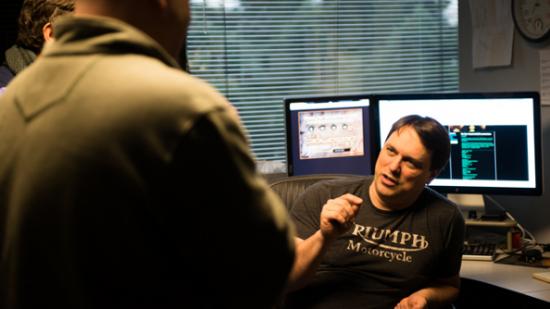Chris Taylor knows he and his company have survived worse moments than this one. But it sure doesn’t feel that way.
He can tell you stories about being millions of dollars in the hole, and dipping deeply into his own personal line of credit to keep Gas Powered Games alive and to make payroll. There have been times when they had debt and no projects and no publishers. There have been times when he’s been at serious risk of not just losing his company, but the home he shares with his family.
“Driving home in my car, owing 4.3 million dollars, and not knowing where payroll was going to come from on Friday, is the most horrifyingly naked, frustrating, shiver-y, feeling,” he says. “Driving into the driveway of my home in tears. I lived these things in my 15 years here!”
And he survived. Paid off every cent he owed. He’s 46 years-old, working on PC games since he was a teenage amateur and a lead designer and studio head since 1998. He has a number of great games to his name in different genres: Total Annihilation, Supreme Commander, and Dungeon Siege. Gas Powered Games remains an independent developer. He’s passed on numerous offers to sell out and bring his company inside a publisher’s umbrella..
But as we have talked over the last week, in a series of interviews for what was originally planned to be a feature series on how a successful Kickstarter looks from the developer’s point of view, it seems like this time is somehow worse.
It probably is: he just laid-off most of his employees. He talks about how much he cried that day, and how he recorded take after take of a video update for Kickstarter, because he kept falling apart. It’s easy to see the strain he’s under if you watch it on the Kickstarter page, where Gas Powered Games is still almost $750,000 shy of its $1.1 million goal with only about two weeks remaining.
Maybe that’s what’s hardest this time. Taylor is used to this when it involves publishers and lousy contracts and deals falling through at the last minute. But with Kickstarter he asked his fans for help, he asked them to invest in him and his newest idea. They’ve been with him since Total Annihilation, through Supreme Commander and Dungeon Siege and even the troubled birth of Demigod. But with the exception of the nearly 7,000 backers his Wildman Kickstarter has attracted, they’re sitting this one out. He doesn’t know why.
This feels personal. This feels like rejection.
“When you have to do the Picard Maneuver for the very first time, you’re not doing the Picard Maneuver. Because it’s never been done before!”
Even now, Taylor isn’t sure what he should have done differently in 2012. It was shaping up to be a great year. Age of Empires Online was going strong, but Taylor knew he couldn’t stake his whole company on AoEO, so he had already taken care to line up a number of other contracts for different publishers. Heading into the fall, Gas Powered had four months’ worth of “burn” in the bank, the operating costs needed to sustain the studio, and its health seemed more secure than it had in years.
But it never rains. Not only did Microsoft inform Gas Powered that they had decided to suspend development on Age of Empires Online, but suddenly Gas Powered’s other contracts started falling apart. Right now there’s a small team at Gas Powered completing work on a project that Taylor is sure will never see the light of day, just to fulfill a contract with a publisher.
Suddenly Gas Powered’s cash reserves represented a life meter, a timer counting down on how long the company had to save itself. To reduce the outflow, Taylor laid off a significant portion of the company. In retrospect, he suspects he should have cut deeper. But he couldn’t.
“We laid off thirty people in October and in December,” he explains. “Two rounds of layoffs. But every round is painful. And every round, you cut closer and closer to the bone. You’re getting into the people who’ve been with the company for five years, ten years. You’re getting closer to the people who have invested themselves in the company. So you hang on.”
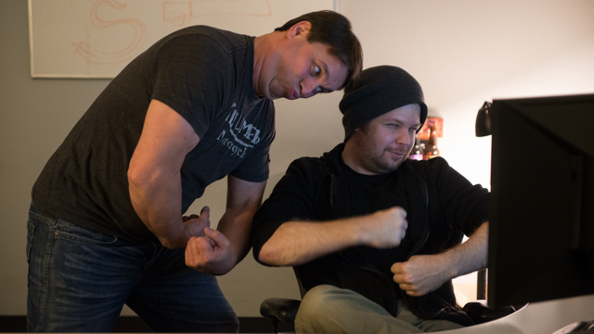
As the odds of getting a new contract worsened, Taylor looked at Kickstarter as a possible lifeline. Gas Powered have a game they’ve done a significant amount of work on: Kings and Castles. It’s a fantasy RTS (think Warcraft meets Supreme Commander) that never quite found a publisher. They’d put it on hold when Age of Empires Online came through, but now there was nothing keeping the studio from resuming work on it. Nothing but money, that is.
The trouble with Kings and Castles, Taylor explained on Reddit last week, is that it was too expensive to complete on the kind of a budget that Kickstarter could raise. “We loved the whole idea, and the blogs, and everything, but couldn’t lock in a publisher. Imagine if you will that [Supreme Commander 1] cost about $11M, and I was simply looking for about half that for K&C, and along came AoEO to save our ass. …I just couldn’t do a Kickstarter for $5M or 6M…”
If Taylor was going to ask fans to chip into a Gas Powered Game, it needed to be something that could be done on the kind of money that Taylor and Kickstarter could raise.
There’s more than simple pragmatism behind this. After fifteen years of running game studios, Taylor is tired of watching the rewards go elsewhere. If you were to go and buy any of the games he or his studio have made over the years, or even if you went on a spree and bought everything from Total Annihilation to Dungeon Siege 2 to Demigod to Supreme Commander 2, Gas Powered would not see a penny of it. None of his games have “earned out” (sold past a certain amount specified in their publishing contracts) to the point where Gas Powered starts receiving royalties. True independence eludes them.
If Taylor and Gas Powered were going to put themselves on the line for another game, and ask their fans to take the leap with them, it was going to be their game. Something they could bring to the digital market themselves and that would belong to them. A game they could support and patch without asking a publisher for permission, a game they could develop and expand without begging for access to their own IP, and a game where they’d earn the money that it makes.
It’s possible. Taylor knows this. “For all those years, developers and publishers were chasing the consoles and there was lots of, ‘PC is dying!’ And they all could not have been more wrong. And now PC is thriving, and digital distribution lets everyone put their games up on Steam or one of many available digital distribution platforms. And I feel like there’s just this really bright future on the other side, but trying to get there is like trying to fit through a keyhole.”
With Kickstarter and Wildman, he thought he’d found a way to open the door and step through.
“I’m looking at Star Citizen, I’m looking at Project Eternity. And I see comparably they did 17,000 backers. 15,000 backers. I have 1500. My numbers are off by an order of magnitude.”
Taylor told everyone he was staking his company on Kickstarter. But it was easy to misread as a figure of speech. Another bit of hyperbole from a man prone to it.
But he was, if anything, soft-pedaling the situation at Gas Powered as the Kickstarter approached. The studio’s cash reserves were getting dangerously low and if the Kickstarter came up short, the studio would be close to broke by the time the Kickstarter deadline passed. He needed a strong early showing from Wildman’s Kickstarter if he was going to run Gas Powered at full capacity through the Kickstarter. Otherwise, he needed to start laying people off while he had cash in-hand.
In Washington state, Taylor explains, it’s very hard for a company to break from its own precedents. Gas Powered has given laid-off employees cash for their paid-time-off (PTO) in the past, and so it would have to do so with a larger layoff as well. With so many long-term employees at the studio, Taylor was looking at a lot of severance and a ton of PTO compensation. If layoffs had to happen, best they happened while there was money to discharge those obligations.
Taylor knew he needed to be decisive about this. “If you waffle and you don’t do it,” he explains, “you just become another statistic. You just become another video game company that put everyone in a room and said, ‘Oh, by the way, today’s your last day and thank you very much.’ And I can’t let that happen.”
But he didn’t think it would. He admits now that he went into the Kickstarter full of optimism and high hopes. He wasn’t thinking about raising $1.1 million for Wildman, he was already figuring out what they’d do with extra money the received. He was nervous before the Kickstarter, but compared the mix of worry and self-deception to when a mother sends her child off to war. They both know it might be the last time they ever see each other, but neither really believes that it will be.
“We got one tenth the money that we needed on Day 1 to make the whole journey sensible. If you’re a betting man, and you’re at the racetrack, and the horse you bet on is a half a lap behind, you can get in your car and drive off. You know this is no Seabiscuit.”
Within a few days of the launch of the Kickstarter, all Taylor’s nightmares were coming true. The response was tepid at best. With each day the trend worsened. Even with the last-minute rally common to many Kickstarter projects, Wildman looked to be nowhere near within striking distance of its goal. The projections were “catastrophic” according to Taylor.
Taylor felt that was the end of the story. He had gone into the Kickstarter knowing it was a final throw of the dice to save Gas Powered, and he’d rolled snake-eyes. He laid off the entire company immediately in what he describes as one of the worst days of his life.
“That was the moment I realized, ‘it’s truly not ever going to happen, Chris. You’re dead.’ And so I said, okay, I’m going to have to pull the trigger, and I’m a fool if I cling to this as a fantasy. I’ve done this way too long to cling to this as a fantasy. And I have to can the Kickstarter.”
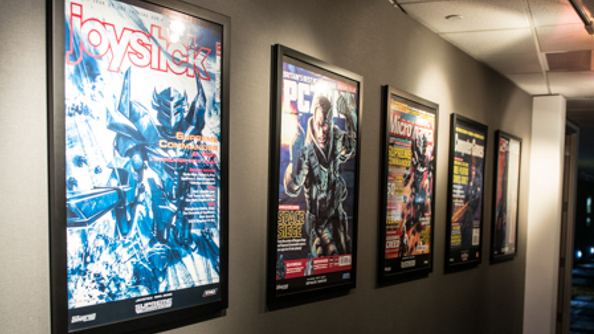
But over the course of the ensuing weekend, he started to wonder whether he wasn’t giving up too easily. While a number of friends and colleagues thought he should shut down the Wildman Kickstarter, he was hearing from backers and other friends that it was too early to quit. That he owed it to himself and to them to stick it out. To make things more complicated, the bad news about Gas Powered had resulted in a spike of donations to Gas Powered. Once again the project seemed like it might have a chance.
He talked to some of the people he had laid-off and offered them a chance to come back. Only a small handful, and with the understanding that they’re spending their severance with the time they’re putting in at Gas Powered. About eight members of the design team have come back to work under those terms. If the Kickstarter fails and the company shuts down, they’ve already used up some of the money they were due as part of their layoff.
“I almost wish the Kickstarter were doing worse,” Taylor admits at one point. “Because then the decision would be made.”
“I feel like it’s that [first] Friday morning all over again.”
Instead, he feels like he’s still trapped back in that awful first week of the Kickstarter, every day having to relive the choice he made to do the layoffs and shut down the Kickstarter. The numbers aren’t really improving, but they’re just strong enough that he can hope the Kickstarter gets a second wind that will propel it across the finish line. In the meantime, he and his skeleton crew of Gas Powered die-hards continue working on the game and keeping an eye of the numbers.
He told his people, “Listen, you know the name of the game here. You saw the response from fans. Do you want to come back and go into this thing with eyes wide open?”
That’s Taylor’s team now. The people who believe in Wildman and understand what the project is all about, and who have the right set of skills to keep producing art, design, and video for the Kickstarter project. If Gas Powered survives this Kickstarter, this group of eight or so developers is going to be the core of the new design team. But Taylor knows he can only ask so much, given how things are going. “If that Kickstarter number stopped moving at all, period, there’s some people here who would say, ‘C’mon now, I’m out. Because I can’t just be here risking my severance.’”
Taylor is beset by misgivings. He knows now that if the project limps its way across $1.1 million, the game he’ll be able to make will not be as fully-featured as the one he hoped for. He also knows that he’ll have to work Gas Powered harder than ever before. He hates crunch, and one of the studio’s core values is that family and health come first. He’s proud of that principle, and now he knows that he’ll likely have to break it if he wants to ship Wildman. I get the sense the Kickstarter has been so harrowing he’s dreading the next stage even more.
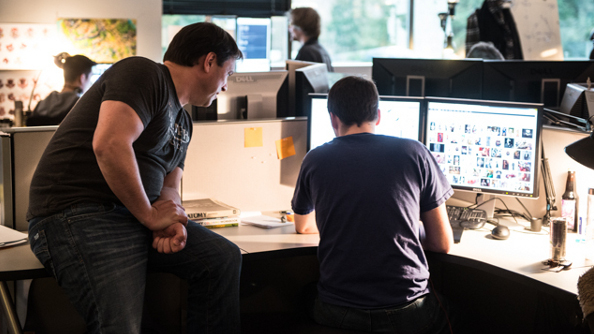
“We’d staff up the team and get to work. And thus would begin a very intense work schedule that will forgo much health and much family,” he says. “So that’s what we’d do. If it’s funded, we’ll deliver an experience that people will go, yeah, this is a GPG game. Probably just not enough of it. That’s what’ll happen.”
He’s disappointed. He really thought he had a good chance of success on Kickstarter. Gas Powered has a long track record of successful developments. They know how to make games and they have all the pieces in place to do another one. What’s more is, he really hoped Kickstarter would prove to be an avenue for doing something new and different.
Nobody that I was tracking on Kickstarter had gone out with an original idea to that extent. Peter Molyneux, who is one of my favorite designers of all time, is effectively remaking Populous. So even he didn’t make that mistake! – Taylor, on Three Moves Ahead
But it’s not, really, not for a developer like him. The Kickstarters that gave him hope, Project Eternity, Star Citizen, Elite, Godus…. they’re all veteran designers selling gamers on their nostalgia. Taylor thought it was the people involved that made those Kickstarters work, and that’s what made him think Wildman would be a success.
But looked at another way, those Kickstarters are all offering gamers something they’ve seen before, and something they have badly missed in the last 10 or 15 years. Taylor’s offering something that’s unlike Total Annihilation, Supreme Commander, or Dungeon Siege, the three franchises he’s best known for. When he describes it to me, it’s something that I think might be a great game, or at least something that sounds interesting and fun. But it doesn’t fire the imagination like a Star Citizen or Project Eternity because it sounds at once too similar to other games that are out there, and it is also just different enough that I can’t fully see the game that Taylor does. Kickstarter is a place of vicarious, aspirational gaming.
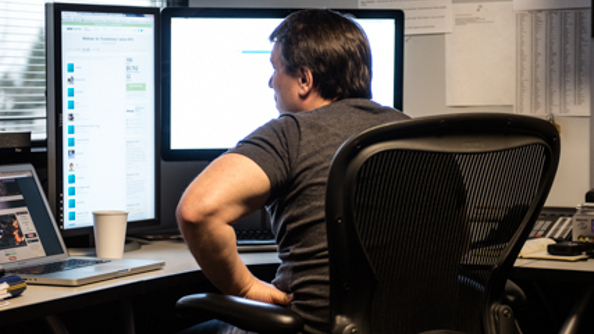
Only now does Taylor fully understand what will sell and will not sell on Kickstarter. On Three Moves Ahead this week, he told us, “I felt like GPG, and Wildman, and my leadership would be the right answer. And people would get behind me… That ‘s been true of the six thousand odd people that have pledged. But that’s not the same turnout that we’ve seen in other games that are nostalgic, frankly, that are going to be remakes of old games that people understand. They can practically see the design of the game in their head.”
There is a warning here. Kickstarter has proved that gamers, particularly veteran PC gamers, are great at remembering the good old days and missing the kinds of games we played back then. We are great at imagining how wonderful those games would be if they were made today, and we’re great at helping those legendary designers make a return. Watching Wildman adrift at $350,000 while the lights go out at Gas Powered, it seems we’re less good at knowing when something is in the process of being lost.
If you ever wondered what it was like to be a Hollywood movie star and be at the top of your game and have to do insurance commericals and watch that happen in front of your eyes, well, I’m going into that territory right now. – Taylor, on Three Moves Ahead
Part of the problem might lie with Taylor. Talking to him, he seems almost ashamed of Kickstarter and the fact that he’s asking people for money. Over the course of our interviews, he repeatedly worried that people would raise their donations beyond a point they can easily afford. He’s quick to devalue himself and Gas Powered. “We’re not doing anything important here. We’re making games.” He needs your money, but he also doesn’t want to take it.
“There’s actually a very huge flaw with [a close] finish. And the fundamental flaw is that there’s a whole lot of really great people who are going to put in way more money than they should. And they’re going to increase their pledges because they’re going to see victory that’s attainable and I don’t think that’s the right way for Kickstarter to work,” he said at one point.
Taylor ended our conversation this weekend with a story about the week he laid-off most of Gas Powered, and the news got out that the situation was so dire. His father called him over the weekend with an offer of help.
His father has money, but he also tends to be tight-fisted. It’s habit. He’s not rich, but he’s comfortably retired after a career as a construction contractor and then a manufacturer.
They were businessesthat Taylor might have inherited, if life hadn’t sent him falling 14 feet from scaffolding at a work site when he was 20, crushing a vertebra in his lumbar. With a bad back, Taylor wouldn’t be able to work in construction, and so he’d been free to devote himself to programming and game design. It had been his passion since his father got him his first computer when Taylor was 14.Now, thirty years later, his father was calling because he wanted to help his son continue in that career.
“Chris, I’ve got $2,000 here that I want to give you,” his father told him. “But… I can’t figure out this Kickstarter site. How do I give this to you?”
Taylor was touched, but also… ashamed? Embarrassed? He didn’t explain why, but he told his father to call his sister and she’d talk him through the Kickstarter process. Then Taylor talked to his sister.
He asked her, “Hey, when Dad calls, could you tell him I was able to put the payment through myself? That he doesn’t need to worry about it? Tell him I took care of it. Just tell him I got his money. And say thanks for me.”
